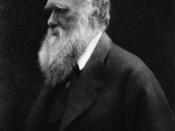Essay: "Do languages struggle for survival?"
PART 1: 19th C
The analogy of languages to living organisms and the concept of natural evolution are already found before the publication of Darwin's Evolution in 1857. Humboldt, who wasn't a historical linguist, already saw language as a living organism. He emphasized that each language lives in the speaker's mind as a vital process and that is only fixed in a steady state when a grammarian writes down its structures and forms at a particular time. Furthermore, he thought that languages are continually seeking perfection and used the term "evolution" alongside with "development".
Later on, Schleicher turned Humboldt's abstract perfectionist evolution into Darwinian survival evolution, which is a historical process taking place in real time. In his short treatise on Darwinian theory and linguistics (1863) he stated that what he had already written on the history and prehistory of languages tallied with Darwin's own evolutionary theory.
He considered language as one of the natural organisms of the world, to be treated by the methods of natural science and one which has its periods of growth, maturity and decline independently of its speakers' will or consciousness.
More examples of the treatment of languages of languages as organic bodies are to be found in Bopp and Pott among many other linguists of the time.
In the nineteenth century the directionality of change, whether languages become simpler or more complex over time, was an important issue in linguistics. In biology, the replacement of old species by new is not a random process, but a movement from lower to higher- mutations which succeed in spreading are those which give their possessor an advantage in the struggle for survival, while disadvantageous traits are eliminated. The most widely held view was that inflecting languages were better and higher than...


